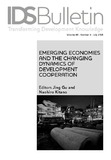The BRICS Effect: Impacts of South–South Cooperation in the Social Field of International Development Cooperation
| dc.contributor.author | Zoccal Gomes, Geovana | |
| dc.contributor.author | Esteves, Paulo | |
| dc.coverage.spatial | Brazil, Russia, India, China, South Africa | en |
| dc.date.accessioned | 2018-07-24T13:56:06Z | |
| dc.date.available | 2018-07-24T13:56:06Z | |
| dc.date.issued | 2018-07-24 | |
| dc.identifier.citation | Zoccal Gomes, G. and Esteves, P. (2018) 'The BRICS Effect: Impacts of South–South Cooperation in the Social Field of International Development Cooperation', in Gu, J. and Kitano, N, (eds) 'Emerging Economies and the Changing Dynamics of Development Cooperation', IDS Bulletin 49.3, Brighton: IDS | en |
| dc.identifier.uri | https://opendocs.ids.ac.uk/opendocs/handle/20.500.12413/13925 | |
| dc.description.abstract | The growing number of development stakeholders and initiatives in developing countries has added complexity to international development cooperation (IDC). Recipient countries have witnessed the increasing presence of emerging countries such as the BRICS (Brazil, Russia, India, China, and South Africa), offering South–South cooperation as an alternative model for development. We call the impact of the new practices of South–South cooperation providers on the prevailing IDC structure the ‘BRICS effect’ – an effect that ultimately destabilises established positions and interaction patterns between agents, and even between traditional donors and recipients. Combining the Bourdieusian notion of social fields with international relations (IR) perspectives on the changing geopolitics of international aid, this article discusses how the BRICS effect challenges established principles and practices from the field of IDC, indicating at least three dimensions: (1) new positions beyond the donor vs recipient dyad; (2) new modes of development cooperation; and (3) transformation of institutional architecture and governance mechanisms. | en |
| dc.description.sponsorship | Japan International Cooperation Agency Research Institute (JICA) | en |
| dc.language.iso | en | en |
| dc.publisher | Institute of Development Studies | en |
| dc.relation.ispartofseries | IDS Bulletin;49.3 | |
| dc.rights | This is an Open Access article distributed under the terms of the Creative Commons Attribution Non Commercial No Derivatives 4.0 International licence (CC BY-NC-ND), which permits use and distribution in any medium, provided the original authors and source are credited, the work is not used for commercial purposes, and no modifications or adaptations are made. https://creativecommons.org/licenses/by-nc-nd/4.0/legalcode | en |
| dc.rights.uri | http://creativecommons.org/licenses/by-nc-nd/4.0/ | en |
| dc.subject | Development Policy | en |
| dc.title | The BRICS Effect: Impacts of South–South Cooperation in the Social Field of International Development Cooperation | en |
| dc.type | Series paper (IDS) | en |
| dc.rights.holder | Institute of Development Studies | en |
| dc.identifier.team | Business, Markets and the State | en |
| dc.identifier.doi | 10.19088/1968-2018.152 | |
| dcterms.dateAccepted | 2018-07-24 | |
| rioxxterms.funder | Default funder | en |
| rioxxterms.identifier.project | Default project | en |
| rioxxterms.version | VoR | en |
| rioxxterms.funder.project | 9ce4e4dc-26e9-4d78-96e9-15e4dcac0642 | en |
Files in this item
This item appears in the following Collection(s)
Except where otherwise noted, this item's license is described as This is an Open Access article distributed under the terms of the Creative Commons Attribution Non Commercial No Derivatives 4.0 International licence (CC BY-NC-ND), which permits use and distribution in any medium, provided the original authors and source are credited, the work is not used for commercial purposes, and no modifications or adaptations are made. https://creativecommons.org/licenses/by-nc-nd/4.0/legalcode


